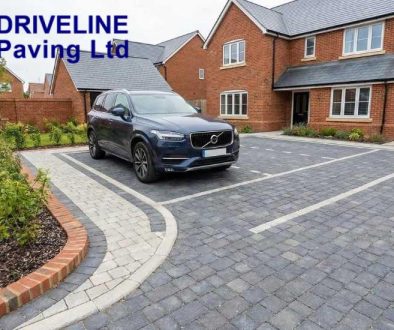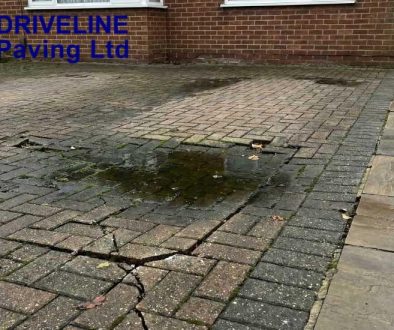Heavy-Duty Driveways for Vans, Campers and Work Vehicles
Not all driveways are created equal. For households with larger vehicles—whether it’s a family campervan, a work van, or a heavy-duty pickup—the demands on a driveway go beyond the everyday. Standard surfaces may look the part, but without the right strength and design, they can quickly suffer from cracks, dips, or rutting. A heavy-duty driveway is built to handle the weight and pressure of bigger vehicles whilst still offering style and long-term durability. Here’s what UK homeowners need to know when planning one.
Why Heavy Vehicles Need More Robust Surfaces
Driveways designed for average family cars may not be able to withstand the concentrated loads of vans or campers. The weight of these vehicles is far greater, and when combined with repeated parking and turning, the stress on the surface and sub-base increases significantly.
If the driveway is not built with reinforcement in mind, problems can occur:
- Cracks and fractures – Common in concrete or tarmac that hasn’t been designed for heavy use.
- Surface rutting – Depressions form where tyres sit repeatedly.
- Uneven settlement – Poorly prepared bases shift under the load, leading to tilting or sinking.
These issues not only shorten the lifespan of a driveway but also create safety hazards and costly repair bills.
Load-Bearing Capacity Explained
The science behind a heavy-duty driveway lies in its load-bearing capacity. This refers to the ability of the surface and sub-base to distribute the weight of vehicles evenly.
- Sub-base strength – The foundation beneath the surface is critical. For heavy-duty driveways, a thicker layer of compacted hardcore or Type 1 MOT aggregate is used.
- Surface durability – The top layer must resist the direct pressure of tyres. Materials with high compressive strength, like reinforced concrete or resin-bound aggregates, excel in this area.
- Drainage support – Waterlogged soil weakens the sub-base. Effective drainage ensures strength is maintained even in heavy rain.
By combining these elements, driveways can withstand the repeated strain of larger vehicles without deformation.
Best Materials for Heavy-Duty Driveways
Choosing the right surface is key. Different materials offer varying levels of strength, aesthetics, and maintenance requirements.
Reinforced concrete
Concrete is one of the strongest materials available. When reinforced with steel mesh or fibres, it delivers exceptional load-bearing capacity. Its smooth surface is easy to maintain, and decorative finishes can add style. The main consideration is to ensure professional installation, as cracks can appear if poorly laid.
Block paving
Block paving combines strength with flexibility. The interlocking blocks distribute loads evenly, making it ideal for heavy vehicles. If damage occurs, individual blocks can be replaced without redoing the entire driveway. A herringbone pattern increases stability under pressure, making it a preferred design for commercial and domestic heavy-use areas.
Resin-bound surfaces
Resin is another excellent option. The combination of natural aggregates bound in resin creates a strong, permeable surface. Resin’s slight flexibility helps absorb pressure without cracking. Its wide choice of colours and textures ensures that strength doesn’t mean sacrificing style.
Tarmac with reinforced base
Whilst standard tarmac may not be enough, a thicker base layer and reinforced design can make it suitable for larger vehicles. However, it may require more maintenance over time compared to resin or block paving.
Each of these materials offers advantages, and the best choice depends on budget, style, and specific vehicle needs.

Design Considerations for Larger Vehicles
A driveway that supports heavy loads must be designed with more than just strength in mind. Practicality is equally important.
- Width – Vans and campers are often wider than standard cars. Driveways should be designed to allow easy access without damaging borders or landscaping.
- Turning radius – Extra space for manoeuvring prevents repeated pressure in a single spot, reducing wear.
- Gradient – A slight slope ensures proper water drainage, protecting the sub-base from weakening.
- Edge restraint – Strong edging prevents blocks or resin from spreading under pressure.
- Parking layout – Designated parking zones can help distribute weight more evenly across the surface.
Taking these elements into account ensures the driveway remains functional as well as durable.
Long-Term Maintenance and Cost Savings
Although heavy-duty driveways are designed to last, routine care ensures they perform for decades.
- Cleaning – Regular sweeping and occasional pressure washing keep surfaces clear of debris, oil, and fuel stains.
- Joint care – For block paving, refilling joints prevents weeds and preserves stability.
- Resealing – Resin and tarmac may benefit from resealing over time to refresh their appearance and protect against wear.
- Inspection – Checking for small cracks or drainage issues allows early repairs before bigger problems develop.
By investing in a robust design and following a maintenance routine, homeowners can avoid costly structural repairs later. The upfront investment pays off in long-term savings.
Homeowners in Woodford who need a driveway built for heavier vehicles can explore durable options on our Woodford driveways service page. It covers strong, long-lasting surfaces designed to handle vans, campers, and work vehicles with ease. See what materials and build methods suit your property: https://drivelinepavingltd.co.uk/woodford-paving/driveways/
Built to Last: The Value of Heavy-Duty Driveways
Heavy-duty driveways are more than just a parking solution for vans and campers—they are long-term investments. A driveway built with strength in mind adds value to the property, prevents damage, and ensures daily convenience for larger vehicles.
Whether you prefer the sleek finish of resin, the classic look of block paving, or the sheer strength of reinforced concrete, the right design guarantees durability and kerb appeal in equal measure.
Need a driveway that can handle vans, campers, or work vehicles? Contact Driveline Paving Ltd today for expert advice and installation. Our team specialises in durable solutions that combine strength with style, ensuring your driveway is ready for anything.



